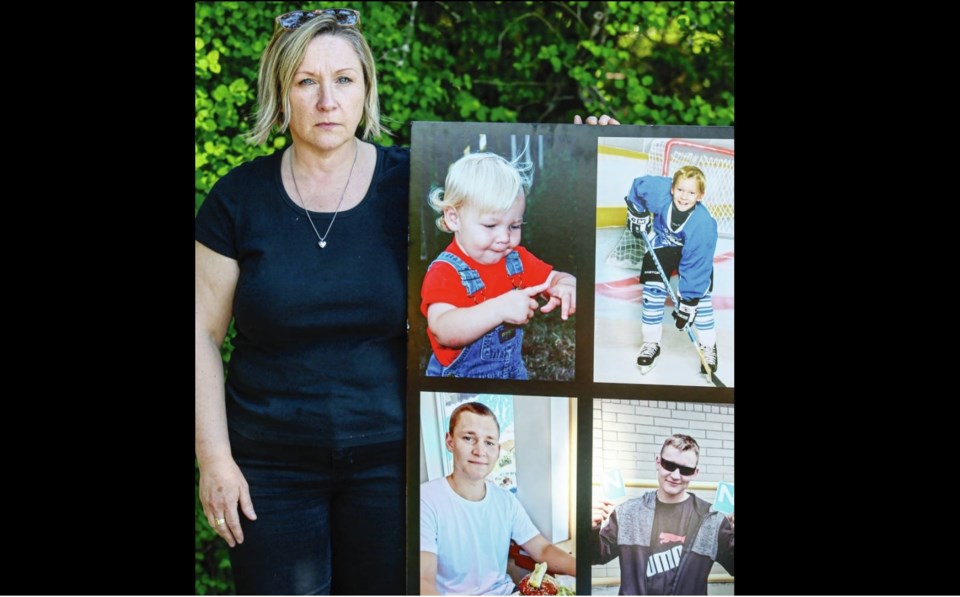The last time Maureen Vincent saw her son, she remembers thinking as she drove off that she needed to find a way to get him into recovery.
It was April 10, 2020, and she was visiting him at Topaz Park to check up on him and drop off some mail. It’s the same day police believe Thomas Poulson died of an overdose, although his body wouldn’t be found for another 12 days, the mail from his mother still in his pocket.
He was 26 years old.
“I just remember looking back at him and just feeling so deflated, that there was nothing we could do to help him through his addiction,” Vincent said. “And if he could have had a clean drug supply, at least he would still have a chance at finding his recovery. And I know he wanted it.”
Poulson was a class clown who made friends easily and loved playing hockey, piano, guitar and the drums. He is one of more than 7,000 British Columbians who have died in the five years since the province declared a public health emergency over the overdose crisis.
Michael Mahoney is another. He was a singer who performed with the Victoria Children’s Choir, loved BMX bikes and often came home from school late because he was treating friends to coffees, said parents Jan and Glenn Mahoney. He was 21 years old when he died in his truck in a downtown Victoria parking lot days before Christmas in 2018.
And Robby Cunningham, who was a social butterfly and an athlete, playing basketball, lacrosse and soccer. He was 24 years old when he died in May 2016.
Cunningham’s mother, Jennifer Howard, said she feels his absence most acutely in the little things.
“His noisy arrival with his two dogs, his sticking his head in the fridge and shouting, ‘There’s nothing to eat here.’ Those are the things that I really miss every day,” she said.
As B.C. marks five years since declaring a public health emergency, the province is taking steps toward decriminalizing personal possession of drugs, but advocates and those who have lost loved ones say the government has been too slow to act.
Every overdose death is a result of policy failure, said Corey Ranger, a registered nurse and clinical lead for the Victoria Safer Initiative, a safe supply project that connects people at risk of overdose with physicians who prescribe pharmaceutical alternatives to the toxic illicit drug supply.
“It’s been five years, and when you really think about it, this is only an emergency by name. If we truly treated this as an emergency, we would have seen courage from those in power, we would have had an accessible and effective safe supply. But we don’t,” he said at a protest outside the legislature organized by Moms Stop the Harm, a network of Canadian families who have lost loved ones to the toxic drug supply.
The group, with 1,000 members in B.C., is calling for an accessible safe supply to prevent further overdose deaths.
The province has made efforts to expand access to safe, prescription alternatives to illicit drugs since the pandemic began, but the current model remains too restrictive, with less than four per cent of people in need of a safe supply actually able to access it, Ranger said.
Safe supply needs to be delivered through a public health model, removing the “bottleneck” of prescribers, some of whom are hesitant to provide access to pharmaceutical alternatives, he said.
In Victoria, 24 deaths were linked to drug overdoses in the first two months of 2021, and the city is “probably on pace for another record-breaking year,” of overdose deaths, Ranger said.
On the eve of the fifth anniversary of the province declaring a public health emergency, Island Health issued warnings of increased overdoses in both Greater Victoria and Campbell River.
The pandemic has led to an illicit drug market that is “terrifying and a chaotic source of supply,” said Lisa Lapointe, chief coroner for the B.C. Coroners Service, with extreme concentrations of fentanyl and newer substances that may reduce the effectiveness of naloxone, which reverses overdoses caused by opioids.
Lapointe joined provincial health officer Dr. Bonnie Henry in calling for bold action to address the overdose crisis.
Henry, who was part of the decision to declare the health emergency five years ago, said progress has been “painfully slow.”
“Much has been done, but more, of course, remains to be done.”
Minister of Mental Health and Addictions Sheila Malcolmson said Wednesday the province is working on formalizing a request to Health Canada for a provincewide exemption for personal possession of drugs.
“We know that stigma drives people to use drugs alone, to hide their drug use and consume alone, and this is fuelling the overdose crisis,” Malcolmson said. “By taking this step, we can address and reduce the fear and stigma and shame that keep people silent about drug use.”
The move reflects a recognition that drug use is a health issue, and those who use substances should not face criminal penalties, she said.
The province is investing $45 million in overdose- prevention services over the next three years.
Donald MacPherson, executive director of the Canadian Drug Policy Coalition at Simon Fraser University, said the move to decriminalization is long overdue, and more effort needs to be put toward replacing the illicit drug supply.
Decriminalization will help to reduce stigma and connect people with services, but “the supply will still be toxic,” he said.
The crisis is worse than ever, MacPherson said, with the province recording an average of five daily drug toxicity deaths in February 2021.
“So where is the urgency? That is the question that people are tired of saying. And I’m sure people are tired of hearing. And that tells me something, that we’re not really serious about giving people access to alternatives to the toxic drug supply,” he said.
— With a file from the Canadian Press




